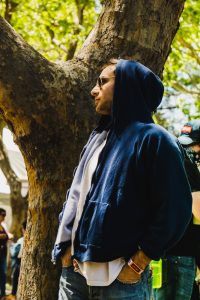INTERVIEW: Yoke Lore seeks to slay his future, takes holistic musical outlook

Yoke Lore photographed at BottleRock Napa Valley at the Napa Valley Expo on May 24, 2019. Photos: Norm deVeyra.
One-time Walk the Moon drummer Adrian Galvin, who now performs and writes music as Yoke Lore, once spent a year living as Buddhist in a monastery in India. While there, he heard a saying that he didn’t understand at first but one that has stuck with him since. And it was a proverb that he has applied to his own career as a musician.
Yoke Lore
9 p.m., Friday, Oct. 4
The Independent, San Francisco
Tickets: $15-18. (21+)
9 p.m., Saturday, Oct. 5
The New Parish, Oakland
Tickets: $15.
“They kept saying it: ‘If you see the Buddha on the street, slay him,’” he recalled. “It’s this crazy idea. You want to meet the Buddha. That’s where you get enlightenment, right? If you fucking see the Buddha; sick! You’re going to meet the Buddha! That’s amazing! But if you see the Buddha on the street, take out your knife and like slay the Buddha. Kill him. Stab him.
“It’s this idea that if you have some preconceived notion of what you think enlightenment is or what you think perfection is, or what you think the future should be—kill it because it’s not going to be that. You need to accept whatever it’s going to be. You need to meet it when it really happens and not meet your version of it or what you want it to be.”
Yoke Lore is kind of like that. Galvin is open to his folk-grounded pop music and his life leading him in the right direction rather than forcing both into his preconceived notions of what he sees for himself in the future. He plans on letting the world define where his songs fit and is instead focusing on doing his best to clarify what he wants to say to the world.
Those may be deep thoughts, but they echo his existentialist messages about the big picture. That’s what you might expect from someone raised by psychoanalyst parents who are also devout to two separate religions.
“If I have this idea of this rock star that I want to be, that I’m playing to millions of crowds; if I see that idea, I’m going to slay him,” he said.
Galvin’s first big break in music came as a drummer with Walk the Moon as that band was just getting started. He and frontman Nicholas Petricca were in an a capella group in Cincinnati together, and when another drummer quit the band, Petricca asked him to fill in for a local show.
“I learned the parts on the way down to the show. I was terrified,” Galvin said.
But he covered well enough to get the invite to join the band, which soon added its final member. Galvin dropped out of school to go on the road with Walk the Moon, but while it was fun, he wasn’t satisfied because it meant putting his own artistic inspirations aside
“Ultimately, I needed something that had a bit more of my essence built within it,” he said.
He left Walk the Moon in 2012 and at first made music under the name Yellerkin before starting the Yoke Lore project in 2016. The name signifies that Galvin’s intent is to tell the stories (or lore) of how people are bound together (by a yoke).
Since 2016, he has released three Yoke Lore EPs, the most recent of which was Absolutes in 2018. His sound blended the synth-pop of bands like Walk the Moon and the gauzy shoe-gaze of M83 with a folky base in his chosen lead instrument—the banjo.
Galvin’s songwriting is open-ended and opaque. Rather than writing about what’s happening in his life, or a current love interest, he widely broadens the scope to include philosophical examinations of himself and how he sees the world. He has described Absolutes as being about looking for ways to accept changes and seeking happiness.
A lot of that has to do with his upbringing. Both of his parents are psychoanalysts. Additionally, his dad is a devout Catholic and his mom a practicing Jew. He, his brother and his sister spent hours in church, Hebrew school, Sunday school and synagogue.
“When we were little, I was forced to do both because they wouldn’t compromise,” he said. “And then you … throw Freud in the picture with both my parents and it’s like, ‘Fuuuuck.’ I had a very esoteric dialogue growing up. That was the family atmosphere. Everything was very detailed and got very academic. We had family meetings every week where we’d all go around and say something nice about every other person. You had to say something you didn’t like about everyone and what we were struggling with. It’s like group therapy for your kids.
“We got really good at arguing.”
This way of thinking, which is known in the academic community as depth-hermeneutics, inspired Galvin to consider the depth in his songwriting.
“I think that’s where you get the juice of life. That’s where you get the good shit,” he said. “That’s where you really find reality. I like to dive in, whether it’s my own stuff or other ideas that I encounter or don’t understand.”
Yoke Lore on touring with LP:
Earlier this year Yoke Lore toured with prolific singer-songwriter LP, whose music millions worldwide have connected with, often without even understanding the lyrics. “If you can convince people who don’t speak the language to feel something and really have an experience, that is such a detailed skill,” Adrian Galvin said.
“It’s wild how consistent she and her entire operation is. It’s just really streamlined and impressive and efficient, and everyone was super kind and super conscientious of us as openers. … Usually people are running around with their fucking heads cut off just trying to get shit done, trying to make it happen. Her entire operation was really smooth and a pleasure to work with.“
Take Yoke Lore’s cover of Savage Garden’s ultimate love song, “Truly Madly Deeply,” which got the Taylor Swift seal of approval in 2018. He turned the throbbing pop song into a funereal banjo-led soliloquy. After he recorded the song, even Savage Garden vocalist Darren Hayes reached out to him and asked for permission to perform the Yoke Lore version.
Galvin also finds inspiration from writing poetry, which is how many of his songs start out. It’s part of his attempt to find better ways to communicate specifically and make listeners understand and identify with what’s on his mind.
“So poetry for me is a constant way to output and just explore, and songs are the more polished versions of those explorations,” he said.
In June, Yoke Lore dove deeper into his own songs by releasing a record of acoustic versions of material from his first three EPs, called Meditations. The record replaces the synths with strings, piano and brass. The EP takes a sparse, piano version of his biggest hit, 2017’s “Beige.”
He decided to release the songs in different constructs after seeing how the songs have affected listeners.
“People connected with them at a level that I didn’t really foresee, and … I feel behooved to offer them something more in terms of the experience they have with those songs,” he said. “I [wanted to] offer the song from a different angle or a different viewpoint, or a different perspective that makes the experience for them more rich and makes the song itself more dynamic.”
Follow editor Roman Gokhman at Twitter.com/RomiTheWriter. Follow photographer Norm deVeyra at Twitter.com/enelledee and Instagram.com/enelledee.


